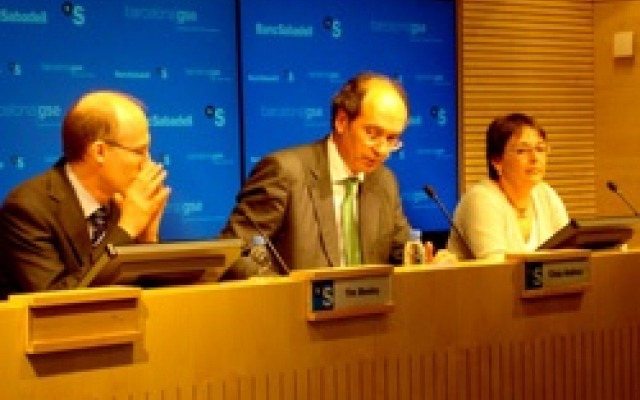research
Professor Besley (LSE) Discusses the Forces that Influence State Capacity at Barcelona Economics Lecture

On Tuesday, April 21, LSE Professor Tim Besley spoke on "The Political Economy of State Capacity" at the 16th Barcelona Economics Lecture. The lecture series, organized by the BSE and Banc Sabadell, regularly brings internationally influential speakers to speak to the BSE community, and has featured in 2008-09 Jean Claude Trichet (ECB), Hugo Sonnenschein (U Chicago), Robert Barro (Harvard) and Esther Duflo (MIT).
After a short welcome by Enriqueta Aragonès, Director of the BSE Research Network, and Cirus Andreu, Managing Director of Banc Sabadell- one of the board member institutions of the School, the floor was given over to Prof. Besley.
Based on recent research with Torsten Persson, Prof. Besley discussed the forces that shape the creation of state capacity. This is of particular contemporary relevance, he says, because “looking around the developing world, the single biggest problem is that states are too weak to gather public revenues and distribute them effectively.” Prof Besley pointed out that in the current economic climate examining state capacity is of particular importance, “especially in countries that have bailed out their banks.”
The first part of the lecture took a broad look at the history of taxation to explain why and how it has become institutionalized in almost all states. Wars and recessions are two of the greatest factors attributing to the huge growth in the size of government in the 20th century, said Prof. Besley, since they create a pressing urge to gather public funds, and in general the public is willing to cooperate.
Prof. Besley asserts that there has been a tendency to focus research on either state or market development as separate narratives. Likewise, there has mostly been focus on policies rather than the capacity of the state to deliver policies. In the second part of his lecture, he focused specifically on state and market development together. Showing a graph of the relationship between size of state and growth, he demonstrates a positive relationship between the two, suggesting a complementarity– not substitutability– between the two factors.
“This relationship suggests that it is important to better understand how governments have been able to appropriate tax resources and to support markets, looking at the role for economics, historical factors and political institutions in shaping the dynamics of states,” said Prof. Besley.
In Besley and Persson’s research, they use a framework assuming a free market in which governments choose investments in improving the operation of states and markets state capacity. They examine both the fiscal and legal capacity of the government, taking into account market forces, government, and politics to better understand the factors that influence the evolution of state capacity. Looking at the resulting model, there is a strong indication of a complementarity of a state’s fiscal and legal capacity.
“It is simply wrong to say that states that do not redistribute through the tax system do not redistribute at all,” says Prof. Besley. “Rather, they choose to redistribute in less efficient ways. The genius of taxation is that is allows for a relatively inexpensive way to redistribute, and in that way oil the wheels of development. The power to redistribute is incredibly important to get people to buy into a process of development in which everyone can share in the proceeds of growth.”
Prof. Besley concluded by making the additional point that, while there is a certain margin for taxes that could be taken into account in investment decisions, it is important to look at the bigger picture. “The narrowness of the margin around which the debate is often conducted – usually focusing on countries that already have large governments and high growth – is not the most important discussion to be having,” he says. “Taking a broader view and considering a historical sense, the major debate is about how to improve governments with small state capacity and low growth. This will almost definitely involve building more effective states in terms of markets and taxation.”
About Prof. Besley
Tim Besley is Kuwait Professor of Economics and Political Science at the London School of Economics and Director of the Suntory-Toyota International Centre for Economics and Related Disciplines (STICERD) at the LSE. He has served on the Bank of England's Monetary Policy Committee from September 2006 to present.
In 2005, he won the Yrjö Jahnsson Award for European economics- widely considered to be the most prestigious award in European Economics for economists under the age of 45. He is a Fellow of the British Academy, a Fellow of the Econometric Society and is a foreign honorary member of the American Economic Association. He is a past co-editor of American Economic Review, and is president-elect of the European Economic Association.
Related papers:
The Origins of State Capacity: Property Rights Taxation and Politics
View lecture slides
